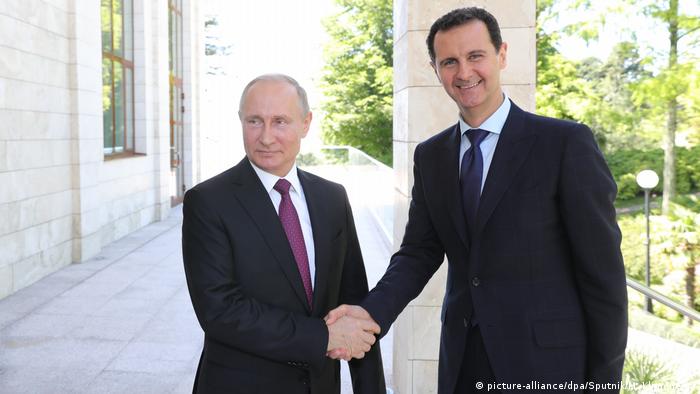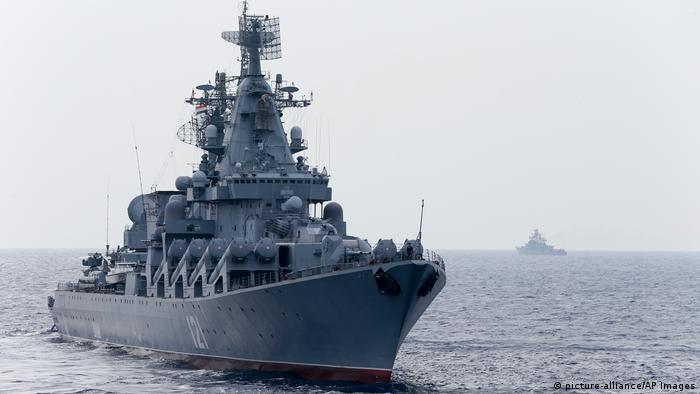Russia first announced military operations in Syria on September 30, 2015. The goal, Russian President Vladimir Putin said at the time, was to combat the terror organization “Islamic State” (IS). It has now been Moscow’s biggest and longest military operation since the fall of the Soviet Union.
The plan originally was for Russia to limit its military involvement to air support for the Syrian army. Later, a limited number of ground troops were to be mobilized in the form of special units and then as military police as the campaign concluded. There were also reports of private paramilitary involvement in the conflict.
Victory over IS and keeping Assad in power
Grigory Lukyanov, an expert at the Russian International Affairs Council and lecturer at the HSE Graduate School of Business in Moscow, believes that fighting terrorism was truly the reason Russia entered the conflict, as Putin said. “And there has indeed been a victory over IS,” Lukyanov said.
He compared Russia’s military support for Syria with Washington’s involvement in Iraq. “A project was stopped that threatened to compromise the territorial integrity of the entire region,” he said, adding that Syria as a country would no longer have existed without Russia’s military support and that Bashar Assad would not have remained its leader. Lukyanov said Syria had called for help before Russia began its operations, but he conceded that Moscow hadn’t been able to end the war quickly.
Markus Kaim, an expert at the Berlin-based German Institute for International and Security Affairs (SWP), also believes that Russia has achieved its goals in Syria. But he sees other reasons for Moscow’s involvement in the region.
“The first goal was for Russia to return to the Middle East after leaving the region as a power player following the fall of the Soviet Union. Now it has returned, and not just in Syria but also in Libya. There’s now no way of getting around Russia,” he said.
Moscow’s second goal, according to Kaim, was to prevent “what was seen as an illegal revolution in its own neighborhood,” with the Syrian opposition attempting to topple Assad. Kaim recalled that there were grave concerns in the fall of 2015 that the Assad regime would fall within weeks.
And thirdly, Kaim said, Moscow wanted to prove it was capable of carrying out such an operation in another country, and it succeeded in doing so, trying out and successfully testing new weapons systems in the process.
This was confirmed by Moscow itself, which repeatedly stated that it was testing out new weapons systems in Syria, including its next-generation T-14 Armata battle tank and new systems for its air force.

Russian President Vladimir Putin and Syrian Presiden Bashar Assad met in Sochi in 2018. The Russian leader did not want to see the Syrian leader lose power.
Diplomatic payoff
Both experts believe that Moscow’s military involvement in Syria has strengthened its position in the region.
According to Lukyanov, “Russia’s presence there is fundamental to its entire Middle East and Africa policy.” He said it has brought about new relationships with other countries in the region, which now see Moscow as a new, influential player. It also plays a role in new diplomatic configurations, he added, highlighting the so-called Astana Process talks, in which Russia has held discussions on the situation in Syria with Turkey and Iran.
Although there have been phases of heightened tensions between Moscow and Ankara, most recently at the beginning of the year when the conflict escalated in Idlib province and a number of Turkish soldiers were killed, the two sides have managed to reach agreement.
Kaim also thinks that Russia’s military involvement has translated into diplomatic influence in the region. He called the Astana peace talks aimed at a post-war Syrian order “an effective alternative to similar efforts within the United Nations.”
However, Russia’s diplomatic gains have so far been limited to the Middle East. Many observers thought at the beginning of the conflict in Syria that Russia would be able to use it to break its partial international isolation following its annexation of Crimea and receive advantages in one arena by making concessions in another. But Russia’s success in Syria didn’t earn it any points in Ukraine or help Moscow normalize its relationship with the West, Lukyanov said, adding that the main thing achieved was establishing new ties with countries in the Middle East region.

Russian military equipment in Syria included navy missile cruisers such as the above, photographed of the Syrian coast in 2015
A question of cost
It is anyone’s guess as to how much Russia has had to pay up to now and is still paying for its military involvement in Syria. In the beginning, talk in Russian media was of 156 million rubles per day (€1.7 million; $1.99 million). Unlike the Soviet Union’s invasion of Afghanistan back in 1979, which caused quite a stir among the Soviet public, Moscow’s involvement in Syria has not met with much disapproval, as troop casualty figures have remained relevantly low. “The lessons of Afghanistan were learned,” Lukyanov said, adding, “The price seemed acceptable.”
But, he said, military involvement in Syria consumes considerable Russian resources, and falling world oil prices and the ongoing coronavirus pandemic are standing in the way of Syria’s economic recovery.
According to Kaim, Russia is trying to get the EU more involved in Syria, but he said this was precluded by the current circumstances in the country. “The humanitarian situation in Syria remains dire from an international and Western perspective,” he said. The high numbers of civilian casualties that have occurred, for example during the offensive against Aleppo, have caused the West to heavily criticize Moscow’s involvement in the conflict.

A Russian jet takes off from Hmeimeem air base in Syria
Russia expands its air base in Hmeimeem
Both experts agree that Russia won’t be leaving Syria anytime soon. According to Lukyanov, If it were to depart, a number of agreements with partners in the region would fall apart. Kaim, meanwhile, is convinced that Russia wishes to stay militarily involved in Syria for the time being and views the country as an outpost of Russian influence.
Russia has indeed come to an agreement with the Syrian government to obtain land near the Hmeimeem Air Base for its own base, next to the already existing navy base that has been in existence since the Soviet era near the port of Tartus.
This article was translated from German by John Doyle
Source: DW



